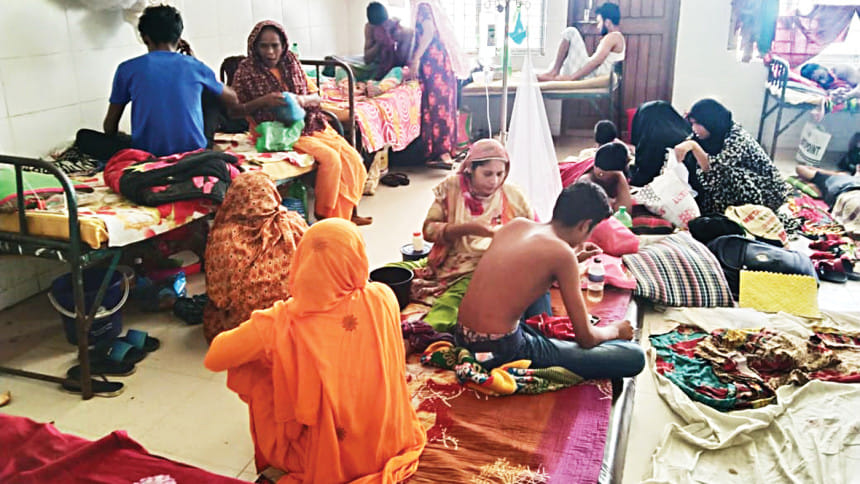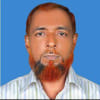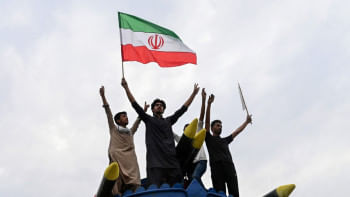Barguna sees sharp spike in dengue

On the day of Eid-ul-Azha (June 7), Omar Al Arabi, a third-grader at Barguna Collectorate School and College, was diagnosed with dengue.
He was first admitted to Barguna General Hospital, then moved to Rahat Anwar Clinic in Barishal. As his condition worsened, he was shifted to the ICU of Anwar Khan Modern Hospital in Dhaka, where he is currently receiving treatment.
Arabi is among many dengue patients in Barguna, which has become a major dengue hotspot this year.
The death toll includes 75-year-old Chan Mia from Charpara village in M Baliatali union, who was admitted on June 9, and 70-year-old Gosai Das from Thanapara in Barguna town.
On June 6, Azmeri Monalisa Zerin, 27, daughter of former lawmaker Zafarul Hasan Farhad, also died while undergoing treatment. Zerin was an LLB student at a private university and the founder of a cake-making business.
According to the Directorate General of Health Services (DGHS), 108 dengue patients were hospitalised in the past 24 hours, with 79 admitted to Barguna General Hospital alone.
Out of 5,411 total dengue cases recorded this year across the country till yesterday, 1,485 are from Barguna. Among 23 reported deaths in the same period, two occurred in Barguna, as per DGHS data.
Currently, 184 patients are receiving treatment at Barguna General Hospital, the data also says.
Residents, entomologists, doctors, and municipal authorities blame the outbreak on poor drainage, waterlogging, indiscriminate littering, and ineffective mosquito control.
"We're continuously bothered by mosquitoes, even during the day. Our families live in constant fear of dengue," said Oliullah Emran, a resident of the Char Colony area.
Md Saiful Islam, a medicine trader at Barguna town's main market, said indiscriminate garbage dumping across the municipality worsens pollution and creates mosquito breeding grounds. "This is a major reason for the severe outbreak," he added.
Md Kamal Hossain, president of TIB's Barguna chapter and general secretary of the Citizen Rights Protection Committee, cited widespread waterlogging and clogged drains as key issues.
LACK OF AWARENESS AND DOCTOR SHORTAGES
Hasanur Rahman Jhantu, president of the Barguna District Health Rights Forum, said the general hospital -- serving nearly 1.2 million people -- faces acute shortages of doctors and resources, affecting both treatment and prevention.
Dr Md Rejwanul Alam, superintendent of Barguna General Hospital, described the situation as overwhelming. The 100-bed facility is overcrowded, with many patients receiving treatment on the floor.
"We've contacted the health adviser and submitted a list of vacant posts. We hope these will be filled soon," he said.
EXPERTS URGE STRONG PRIMARY HEALTHCARE SYSTEM
Public health expert Mushtuq Hussain said an IEDCR pre-monsoon survey (not yet officially released) found a higher density of mosquito larvae in the Barishal division than in Dhaka.
He attributed the outbreak to a lack of cleaning, favourable weather for Aedes breeding, and abundant breeding sites. He called for a layered treatment system with clear primary, secondary, and tertiary levels to reduce mortality and streamline patient management.
"A stronger primary healthcare system is essential. Many avoid dengue testing due to limited access at local clinics, leading to late diagnoses, especially in impoverished areas," he said.
"If testing is available nearby, people will seek help earlier. Currently, most avoid testing due to limited facilities," he added.
He also recommended setting up more blood collection centres and secondary care facilities to reduce the burden on medical college hospitals.
Critical patients could be transferred from secondary facilities to tertiary hospitals when necessary, he said.
Hussain stressed the importance of year-round, community-driven cleaning efforts. "Right now, it's a routine exercise. We need continuous monitoring to control mosquito populations," he added.
Entomologist GM Saifur Rahman said Barguna's coastal location makes it more vulnerable, as people often store water, creating breeding grounds.
Rahman underscored the importance of strengthening surveillance and eliminating mosquito breeding sites.
"Many still think dengue is a Dhaka-centric issue. This perception must change," he said.
Prof Kabirul Bashar, an entomologist at Jahangirnagar University, said their recent survey found high mosquito larvae density in Barishal, Barguna, Chattogram, and Cox's Bazar.
"If immediate action isn't taken, the situation in Barguna will worsen," he warned.
Prof Bashar emphasised the urgent need for comprehensive mosquito control across the country. "The government must ensure equal attention and resources for all districts," he said.
AUTHORITIES' RESPONSE
Animesh Biswas, additional deputy commissioner (general) and administrator of Barguna Municipality, acknowledged problems like poor drainage, waterlogging, and indiscriminate waste dumping.
"Some areas flood during high tide, but water usually recedes. However, clogged drains and poor waste management remain major issues," he said.


 For all latest news, follow The Daily Star's Google News channel.
For all latest news, follow The Daily Star's Google News channel. 



Comments